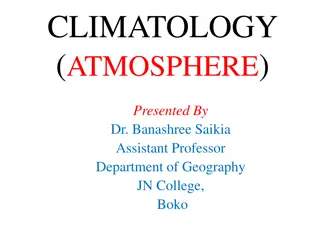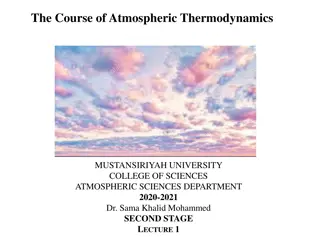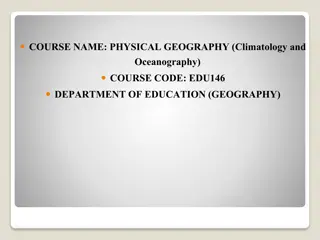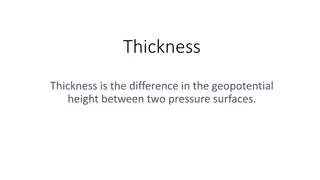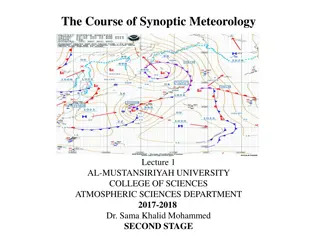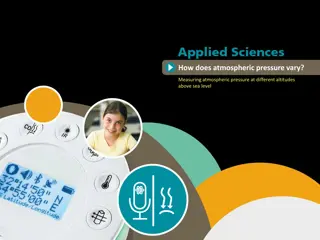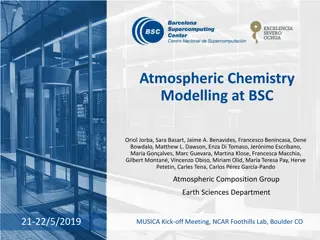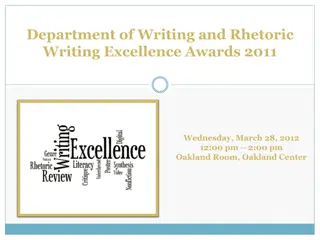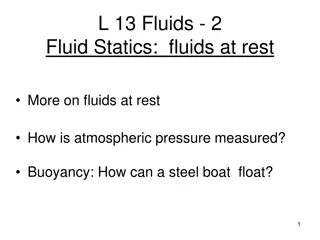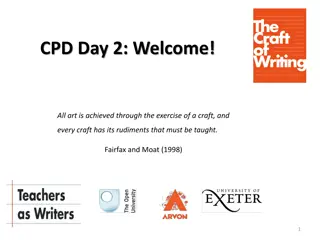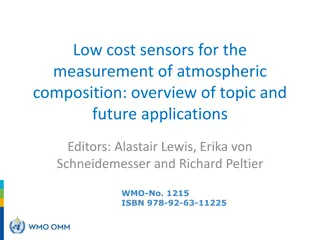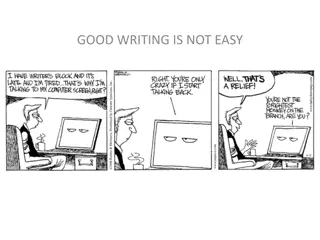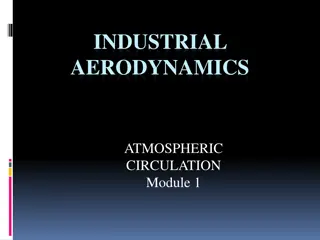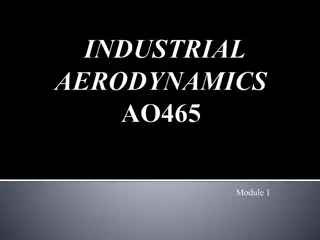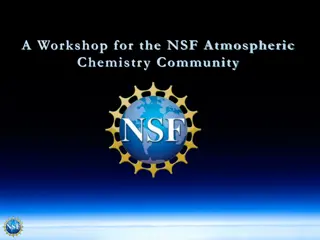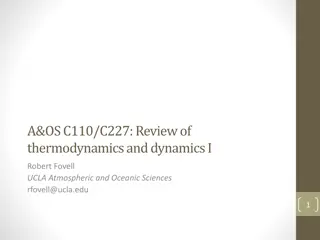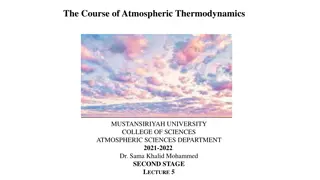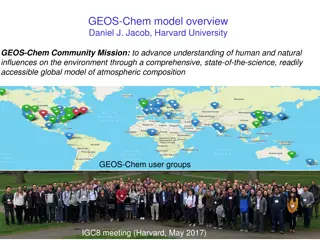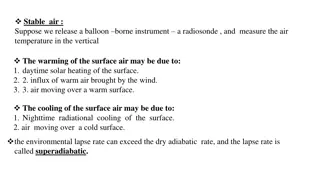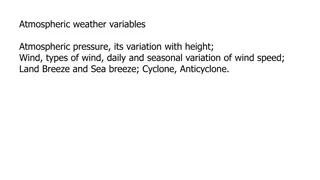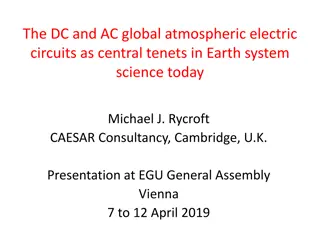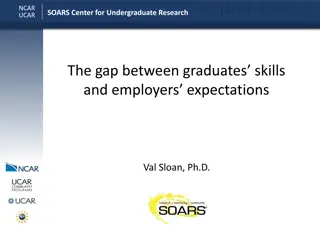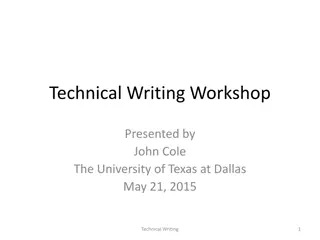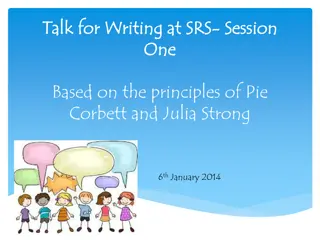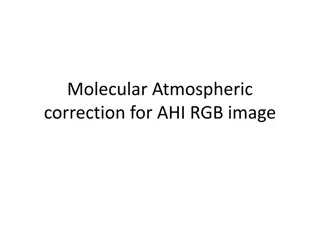Exploring Citizen Journalism and Non-Fiction Writing
Explore the world of citizen journalism and non-fiction writing, learning about text types, adapting writing to conventions, considering audience, purpose, and tone. Discover the significance and usefulness of non-fiction writing, and delve into creating various text types. Uncover the role of citiz
1 views • 11 slides
Comprehensive Overview of English Writing Course
This comprehensive English writing course, led by lecturer Muhammad Muslim Nasution, covers various aspects such as grammar, vocabulary, writing styles, and assessments. Students are required to actively participate, submit assignments, attend classes regularly, and produce writing projects. The cou
2 views • 8 slides
Understanding Atmosphere Composition and Structure in Climatology
The study of climatology, focusing on the atmosphere, is presented by Dr. Banashree Saikia, covering topics such as atmospheric composition, insolation, temperature variations, atmospheric pressure, wind systems, atmospheric moisture, climatic classification, cyclones, and monsoons. The atmosphere,
1 views • 9 slides
Understanding Geopotential and Geopotential Height in Atmospheric Thermodynamics
Explore the concept of geopotential and geopotential height in atmospheric sciences, focusing on their significance in understanding gravitational and centrifugal forces on Earth. Learn about the definition, calculation, and applications of geopotential height in relation to atmospheric properties a
1 views • 14 slides
Understanding Atmospheric Moisture in Physical Geography
Atmospheric moisture, in the form of water vapor, liquid water, and ice, plays a crucial role in shaping weather and climate. This course delves into the dynamics of atmospheric moisture, including its distribution, effects on weather patterns, and impact on various climatic factors such as precipit
0 views • 7 slides
Mastering Academic Writing: Strategies for Success
Academic writing is a formal style of writing with specific characteristics such as accuracy, brevity, and clarity. Understanding academic style is crucial for success in your course as it reflects your engagement with the content. Successful academic writers read, learn new vocabulary, and have a s
0 views • 23 slides
Challenges and Perspectives in Academic Writing for English Learners: Insights from Yemeni Students and Educators
Exploring the challenges and experiences of MA English students in academic writing, the narrative reveals issues faced by learners in Yemen such as outdated curricula, lack of teaching aids, and struggles with writing skills. Insights from a teacher highlight improvements in syllabi yet continued c
0 views • 14 slides
Academic Writing Essentials: Background, Types, and Formats
Explore the essential aspects of academic writing in this comprehensive guide. Learn about the purpose of academic writing, common types such as projects and essays, and the formats for short and long writing tasks. Discover the features of academic writing like accuracy, objectivity, and formal sty
6 views • 46 slides
Understanding Graduate-Level Writing in Academic Communication
Explore the nuances of academic writing at the graduate level in the School of Communication with Francesca Gacho, a Graduate Writing Coach. Learn about the features, characteristics, and strategies necessary for various genres of writing in this context. Discover the expectations and conventions of
2 views • 30 slides
Understanding Atmospheric Thickness and Its Applications
Atmospheric thickness refers to the difference in geopotential height between two pressure surfaces, which is dependent on the mean virtual temperature of the layer in between. This concept plays a key role in determining temperature gradients, identifying fronts, and aiding in weather forecasting,
0 views • 11 slides
Understanding Synoptic Meteorology: A Comprehensive Overview
Synoptic meteorology delves into various aspects of atmospheric sciences, encompassing scales of atmospheric motion, weather maps, air masses, fronts, jet streams, and more. Through the study of synoptic meteorology, meteorologists gain insights into interpreting the state of the troposphere and for
1 views • 17 slides
Understanding Atmospheric Pressure Variations at Different Altitudes
Atmospheric pressure varies with altitude due to the weight of the air column above. This activity explores how Otto von Guericke's experiments with vacuum systems demonstrate the power of air pressure. Theoretical concepts of atmospheric pressure are discussed, highlighting its relation to gravity
0 views • 28 slides
Cutting-Edge Atmospheric Chemistry Modeling Research at Barcelona Supercomputing Center
Conducted by the Atmospheric Composition Group at Barcelona Supercomputing Center, this cutting-edge research focuses on atmospheric chemistry modeling using advanced tools and frameworks like HERMESv3 and MONARCH. The team's approach integrates various modules to study complex processes influencing
0 views • 16 slides
Creative Teaching Approaches for Persuasive Writing Workshop
The workshop focuses on using Grammar for Writing principles to enhance teaching of persuasive writing, emphasizing modal verbs and adverbials. It encourages creative writing by engaging young writers' imaginations and beliefs, allowing freedom to explore ideas. Participants learn key teaching princ
0 views • 51 slides
Department of Writing and Rhetoric Writing Excellence Awards 2011
The Department of Writing and Rhetoric at Oakland University organized the Writing Excellence Awards in 2011, recognizing outstanding submissions across various categories including writing from/about sources, original research, visual and/or auditory composition, fiction, and creative nonfiction. T
1 views • 42 slides
Understanding Fluid Statics and Atmospheric Pressure Measurements
Exploring the concept of fluid statics, this content delves into topics such as how atmospheric pressure is measured, buoyancy, and why a steel boat can float. It covers the measurement of pressure, the relationship between pressure and depth in fluids, and demonstrations showcasing these principles
0 views • 24 slides
Comprehensive Guide to Kindergarten Writing Training for NYSESLAT 2019
Explore a detailed guide on Kindergarten Writing Training for the NYSESLAT 2019 exam. The training covers four constructed-response types including Letter Writing, Word Writing, Sentence Writing, and Writing a Story. Gain insights into the application of holistic writing rubrics, analyzing student r
0 views • 24 slides
Craft of Writing Framework for Teaching Writing
Explore the Craft of Writing Framework to enhance your teaching of writing skills, transforming your Arvon residential experiences into effective classroom strategies. Embrace language choices, text-level decisions, authorship, writing processes, and reader-writer relationships to empower students i
0 views • 39 slides
Enhancing Postgraduate Academic Writing: Feedback Collaboration Model
Developing a collaborative model for postgraduate academic writing courses involves understanding the role of feedback, focusing on content feedback, and exploring the intersections between discipline specialist and writing tutor feedback to improve academic writing abilities. Feedback offers valuab
1 views • 27 slides
Overview of Low-Cost Sensors for Atmospheric Composition Measurement
This publication provides an insightful overview of low-cost sensors for measuring atmospheric composition, covering topics like sensor technologies, applications in atmospheric sciences and air quality management, and evaluation methods. It emphasizes the importance of not only the technical perfor
0 views • 17 slides
Leonardo da Vinci and His Mirror Writing
The students of Luca Tozzi College in Frignano, Italy, explore Leonardo da Vinci's specular writing, a unique form of left-handed writing that can only be deciphered using a mirror. Discover Leonardo's diverse talents as a painter, inventor, scientist, and writer, with a mysterious side to him as a
0 views • 14 slides
Mastering the Art of Good Writing
Crafting compelling writing requires attention to detail, from intriguing leads to precise word choices and smooth transitions. Explore the essential elements of good writing, including tips for engaging readers and a checklist for evaluating writing quality. Learn about different types of leads in
0 views • 42 slides
Understanding Atmospheric Circulation on Earth
An atmospheric circulation driven by temperature differences between the equator and poles influences global weather patterns. The sun's changing angle throughout the year results in various pressure areas and the formation of large circulation cells. The main effects include the transport of humidi
0 views • 11 slides
Enhancing Writing Skills at Escrick C of E Primary School
At Escrick C of E Primary School, the approach to English education focuses on core skills like phonics, reading, writing, and letter formation. The curriculum incorporates a variety of text types and genres, including persuasive writing, biographies, fiction, and poetry. Writing activities are embe
0 views • 10 slides
Understanding the Planetary Boundary Layer in Atmospheric Science
The Planetary Boundary Layer (PBL) plays a crucial role in atmospheric dynamics, divided into surface, mixed, stable, and residual layers. During the day, the mixed layer experiences convective motions due to surface heating, while the stable layer dominates during the night. Understanding these lay
0 views • 18 slides
Writing in Computer Science Research: Enhancing Technical Writing Skills
This course overview covers the main objectives, class structure, and learning outcomes of a Computer Science Research Writing course focused on developing students' writing abilities, providing constructive criticism, and applying technical writing concepts to research papers in a workshop format.
0 views • 46 slides
NSF Atmospheric Chemistry Program Overview
The NSF Atmospheric Chemistry Program aims to characterize the chemical composition of the atmosphere, understand chemical processes, quantify fluxes of chemical substances, study natural and anthropogenic causes of variability, and assess impacts on climate. The program supports research through pe
0 views • 6 slides
Understanding Atmospheric Chemistry Measurements and Methods
Explore the various types of atmospheric chemistry measurements, including research vs. monitoring, gas phase species, satellite vs. in situ observations, and spectroscopy and chromatography methods. Discover how researchers and regulatory bodies use different techniques to study and monitor air qua
0 views • 34 slides
Understanding Atmospheric Composition and Structure
The presentation covers fundamental concepts related to the Earth's atmosphere, including its composition, origin of oxygen, dry and moist layers, standard atmosphere layers, and temperature variations. Key topics discussed include the primordial atmosphere, atmospheric constituents, water vapor dis
0 views • 58 slides
Understanding Atmospheric Thermodynamics and Environmental Lapse Rate
Explore the concepts of atmospheric thermodynamics including the Parcel Method, Environmental Lapse Rate, and Conditionally Unstable Atmosphere. Dive into the details of how air parcels behave in different atmospheric conditions and understand the significance of temperature changes in the atmospher
0 views • 27 slides
Spring into Writing: Enhancing Writing Skills for Children
Join us for an evening dedicated to enhancing writing skills for children according to Maryland College and Career-Ready Standards. Learn about writing expectations, get motivated writing ideas for children, and explore fun writing opportunities at home. The event will provide insights into differen
1 views • 19 slides
GEOS-Chem Atmospheric Chemistry Model Overview
GEOS-Chem, developed by Daniel J. Jacob at Harvard University, is a global model of atmospheric composition used to understand human and natural influences on the environment. The model addresses various atmospheric chemistry issues on different scales, from local to global, and is regularly updated
0 views • 19 slides
Understanding Atmospheric Stability and Adiabatic Processes
Atmospheric stability is crucial in determining weather conditions. Different processes such as adiabatic cooling play a significant role in the vertical movement of air masses. Understanding the environmental lapse rate, moist and dry adiabatic rates, and the concept of conditional instability help
0 views • 4 slides
Understanding Atmospheric Pressure, Wind Variations, and Humidity in Weather Systems
The atmosphere is composed of various elements like gaseous molecules, water vapor, and dust particles. Key weather variables include atmospheric pressure, temperature, humidity, wind, cloud cover, and precipitation. Atmospheric pressure is influenced by the weight of air above a point, with average
0 views • 17 slides
The DC and AC global atmospheric electric circuits as central tenets in Earth system science today
The presentation at the EGU General Assembly highlighted the significance of DC and AC global atmospheric electric circuits in Earth system science. Key references from 2007 to 2018 underscore the evolving research in this field, exploring the interconnectedness between the space environment and the
0 views • 23 slides
Addressing the Gap Between Graduates' Skills and Employers' Expectations in Atmospheric Geosciences
The article discusses the skills gap in the atmospheric geosciences field, highlighting key technical and communication skills needed by graduates and postgrads. It explores strategies to bridge this gap through surveys, creative solutions, and innovative approaches like updating degree requirements
0 views • 5 slides
Comprehensive Technical Writing Workshop by John Cole at The University of Texas at Dallas
Explore the world of technical writing with John Cole, an experienced instructor at The University of Texas at Dallas. This workshop covers the fundamentals of technical writing, including course objectives, programming, course outline, traits of technical writing, and what technical writing truly e
0 views • 58 slides
Analysis of Atmospheric Parameters and Transmission at OHP in 2018
This analysis focuses on the atmospheric parameters and transmission at the Observatoire de Haute-Provence (OHP) during 2018, with a specific emphasis on distinguishing between typical winter and summer conditions. The study utilizes MERRA2 data from January to August to examine pressure, precipitab
0 views • 16 slides
Enhancing Writing Skills Through Talk for Writing Approach
Discover the key principles of Talk for Writing, understand the importance of Shared Writing, and explore how to improve the teaching and learning of writing in your classroom. Learn about the challenges children face in writing compared to reading and how Talk for Writing can help externalize the i
0 views • 27 slides
Atmospheric Correction Techniques for Satellite Image Enhancement
Atmospheric correction is essential for improving the quality of Remote Sensing images captured by satellites. This process involves correcting for the effects of atmospheric gases such as scattering and absorption on the measured Top-of-Atmosphere (TOA) reflectance. Techniques like molecular correc
0 views • 8 slides


